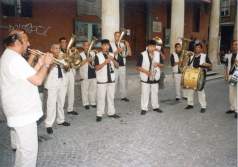
Karandila
Gypsy Brass Orchestra (Bulharsko)
Desetičlenná dechová kapela Karandila hraje tradiční i moderní romské rytmy,
expresivně vyjadřuje orientální tradice.
V její hudbě, která má vždy sladce nahořklou příchuť, se prolínají radost
s tragikou.
Tento dechový orchestr hraje především vlastní skladby, zejména svatební. Písně
beze slov evokují také cestování, krajinu, barevný obraz svérázné melancholie.
Je v nich obsažena emotivní poezie nomádů, členové kapely jí dosahují ohromnou
virtuozitou a nespoutaností hudebního projevu.
V létě 2000 pořádal orchestr turné v Itálii s Goranem Bregovicem. Nyní
působí v produkci Ivo Papasova.
Ohlasy v tisku:
Karandila je svatební kapela s dlouhou tradicí. Hraje živěji a víc jazzově než
ostatní tradiční skupiny. Rytmická složka připomíná poněkud jazz z New Orleansu.
Při poslechu této balkánské muziky si pomyslíte, že jazz nevznikl v Americe, ale
na balkánských svatbách.
ALIGN=RIGHT>Günther Huesmann
"Prošli jsme už mnohými cestami a někdy jsme dokonce potkali dobré lidi."
Tento smutný refrén "Djelem Djelem", neoficiální romské hymny, dokazuje staletí
útlaku a pronásledování. Ale když Michailov Ticheliev, hlava dechového orchestru
Karandila, začne hrát na trubku, mohli byste uvěřit, že píseň vznikla na Bourbon
Street v New Orleansu.
Svět se sjednocuje, i v hudbě. Karandila, původně orchestr hrající na svatbách,
byl rozhodně nejfolklorističtější kapelou na festivalu "Jazz Across the Border"
v Berlíně. Přesto je některé frázování převzato z jazzu. Desetičlenný orchestr
má koncertní zkušenosti, skvěle produkovaný CD s titulem "Stories of the
Survival" právě vyšel. Na pódiu však problémy etnické menšiny ustupují
do pozadí, převažuje čistá radost ze života. Karandila hraje hlavně hudbu
svatebních veselic, a ta uvádí publikum do totálního vytržení.
Termín "balkánské blues" je pravdivý. Vyjadřuje nesmírný temperament
s melancholickými podtóny. Muzikanti báječně improvizují, je to ohňostroj
rychlýh běhů.
ALIGN=RIGHT>Uwe Sauerwein/Berliner Morgenpost
Karandila
Gypsy Brass Orchestra (Bulgaria)
With brass instruments the ten-person gipsy band "Karandila" presents
traditional as well as modern gipsy rhythms - an expressive experience of
oriental tradition.
The music radiates joy and tragic at the same time - a bittersweet taste. In
the different symbols of the play - wedding party or travel, landscape or
colour pictures of melancholy develop - a song without words. In the freedom
and virtuosity of these musicians the emotional lyrics of nomads is awakening.
Summer 2000 the Group made a tour with Goran Bregovic in Italy.
"Karandila is a wedding band which lasts out extremely long. And they play more
lively, agile and more jazzlike than traditional bands. This brass orchestra
mainly plays its own compositions. With ist drum metres reminding of the "second
line" rhythms of the New Orleans Jazz Karandila is celebrating a Balkan music
which makes you believe jazz was not invented in America but on the weddings of
the Balkan."
ALIGN=RIGHT>Günther Huesmann
"We have walked many ways already - sometimes we even met some good people
then." The sad refrain of "Djelem Djelem", the inofficial hymn of the Roma,
witnesses centuries of suppression and prosecution. But when Michailov
Ticheliev, head of the Bulgarian brass orchestra Karandila starts to play his
trumpet you might think the song had been made in Bourbon Street in New Orleans.
The world is coming together, also in music. Karandila, the wedding orchestra
from Sliven, was certainly the most folkloristic contribution at the "Jazz
Across the Border" festival in Berlin ... Even with this traditional gipsy
orchestra some phrasation is obvisiously taken from jazz. The ten-man band has
concert experience; the CD with the title "Stories of the Survival" -
excellently produced - has recently been released. On stage, however, little
is felt about this programmatic claim to point out to the situation of an ethnic
minority. Here pure love of life is ruling. Karandila is playing what they
mainly earn their bread with - wedding music. And this makes the audience
absolutely excited.
The term "Blues of the Balkan" is really true. Despite the impetuous, nearly
archistic temperament there are overtones of some melancholy. The musicians are
merrily improvising... a firework of speedy runs."
ALIGN=RIGHT>Uwe Sauerwein / Berliner Morgenpost
